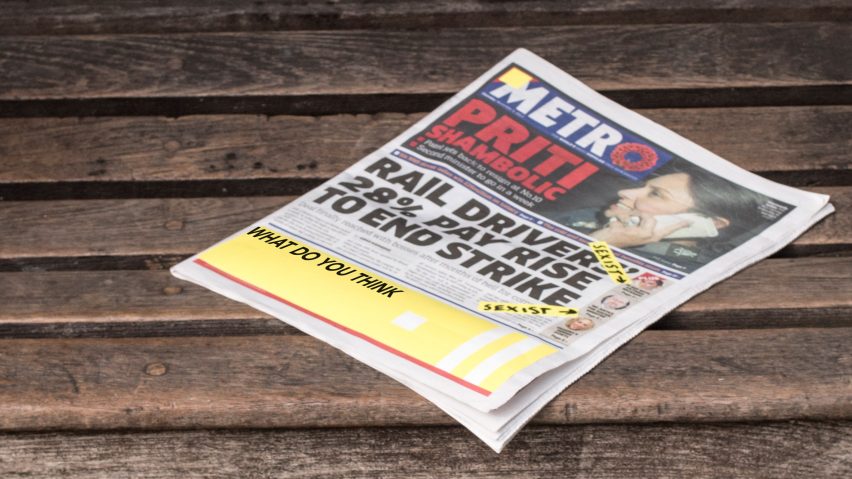Dezeen promotion: a shoe that leaves a trail of messages behind as you walk and a tool for leaving comments on newspapers have been named the first winners of Makerversity's protest-themed competition.
Creative co-working space Makerversity has revealed the first winners of its Tools for Change series – a set of competitions looking at how design be used to tackle societal issues.
Joint first place in the competition was Open-Source Editing, a project by designers and creatives Yun-Pei Hsiung, Matthew Perchard and Sabina Weiss.
This project mimics online liking and commenting tools, giving the public the power to engage with physical newspapers and magazines.
The designers came up with the concept in an attempt to provide more transparency between readers and the media.
"News companies are biased – people do not critically engage with facts as they believe in the newspaper’s authority," they said.
The makers also hoped that Open Source Editing could become a preventative tool in reducing "hate-fuelled" news.
"We wanted to give a physical platform for the public to be exposed to a variety of opinions allows for a better chance to understand each other’s point of view. This is a preventative tool for balancing conflicting views in the society and de-radicalising the news".
Designer Jacob Boast's Stamp: A Protest Shoe was the second Tools for Change winner.
The device is attached to the back of a shoe and dispenses stickers as the wearer walks – leaving behind an imprint of protest messages.
Boast designed the mechanism to give people a more creative way to leave their message and present protesters with a physical mark of their protest.
"To the non-protesting member of the public, the energy and creativity of a protest can disappear once the protesters have left the scene," he explained. "Stamp leaves behind an imprint of the protest message on the urban landscape."
The projects were chosen out of a range of entries that had been created during Makerthon's two-day Hack event session in November.
The first in its series, the event asked delegates to re-imagine protest – from how we engage with it, to creating new tools to facilitate collaboration in a crowd.
"In the last two years the dynamics of politics have shattered the way we think about democracy and now more than ever people want to have their voices heard," said Makerversity. "Design as a tool can help shape how we have those conversations and how we engage with other members of the public."
Makerversity is a London and Amsterdam-based group that provides workspaces and tools for creative businesses. Visit the organisation's website to find out more information about the next Tools for Change series.

